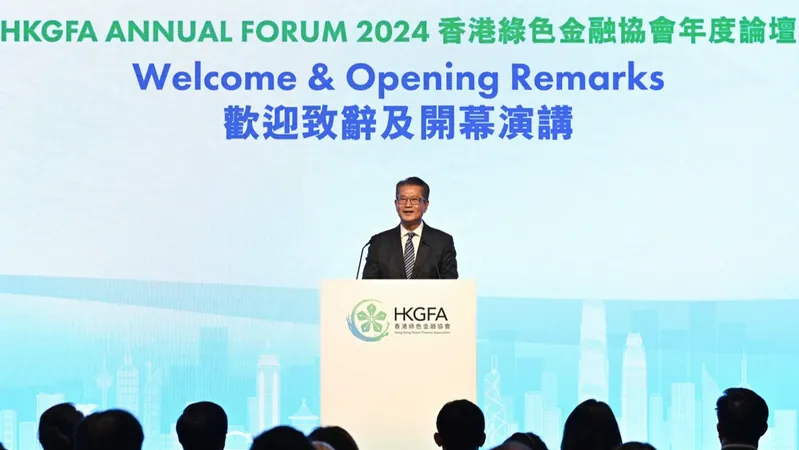
Hong Kong's Green Revolution: Seizing Investment Opportunities in the Race to Net Zero
2024-10-09
Author: Wai
Hong Kong's Green Revolution: Seizing Investment Opportunities in the Race to Net Zero
In a groundbreaking move towards sustainable development, Hong Kong stands on the brink of a green investment boom as industries turn away from carbon-intensive practices. This shift was underscored at the Hong Kong Green Finance Association (HKGFA) Annual Forum 2024, aptly themed "Financing Asia’s Net Zero Transition," held on Wednesday.
Financial Secretary Paul Chan Mo-po, speaking at the event, highlighted the vast economic potential that the global push for carbon neutrality creates. He emphasized the importance of supporting high-emission industries in their transition to sustainable practices through financial and technological assistance.
"Transition finance is not just an obligation; it's a remarkable business opportunity for Hong Kong," Chan remarked. This type of finance focuses on decarbonizing heavy industries like steel, aviation, and shipping—sectors traditionally known for their high emissions. However, Chan also raised an important concern: the risk of "greenwashing," where companies misrepresent their environmental practices to attract investment.
"It's essential to ensure that the funds directed towards carbon reduction genuinely contribute to sustainable practices and do not support the status quo," he cautioned.
Hong Kong has made significant progress in sustainable investing, with green bonds and other debt instruments averaging over $63 billion issued annually over the past three years. The number of authorized ESG (Environmental, Social, and Governance) funds has surged, currently exceeding 230, with assets under management surpassing $160 billion—a remarkable 60% increase compared to just three years ago.
"This growth signals Hong Kong's strong foundation in green finance," Chan stated, citing the city's robust regulatory framework and mature market infrastructure as key contributing factors.
Expanding further, Ma Jun, head of the HKGFA, suggested that Hong Kong could benefit from adopting transition finance standards similar to those on the Chinese mainland. He noted that 22 local governments in China have already implemented classification methods for transition finance, in alignment with the initiatives from the People’s Bank of China, which has introduced a pilot program for national standards.
"By adopting these standards, we can better direct private capital towards essential transition activities," Ma explained. He also advocated for the integration of International Sustainability Standards Board (ISSB) disclosure standards to enhance transparency among financial institutions and companies in Hong Kong, despite recognizing the challenges involved, such as accurately calculating carbon emissions.
Zhang Bei, representing the People's Bank of China, echoed the call for collaboration, announcing the rollout of new transition finance standards covering various industries, from textiles to metals, following the successful implementation of standards for steel and agriculture.
Highlighting the regional significance, Albert Park, Chief Economist for the Asian Development Bank, portrayed the bank’s commitment to climate initiatives, pledging $100 billion in climate-related financing in the Asia-Pacific by 2030. He highlighted the bank's efforts to reduce risks in sustainable projects through innovative financing structures, using Cambodia’s energy transition plan as a noteworthy example.
The forum attracted more than 1,500 attendees, including policymakers, financial regulators, and representatives from civil society, bolstering the collaborative spirit necessary for a successful green transition.
Founded in 2018, the HKGFA aims to position Hong Kong as a pivotal global hub for green finance, facilitating access to sustainable financing opportunities not just locally but also across the broader region involved in the Belt and Road Initiative.
As Hong Kong embraces this green transition, the future looks promising for sustainable investment, economic growth, and the relentless pursuit of environmental responsibility. Will this city truly become Asia's beacon for green innovation? Only time will tell, but the momentum is undeniably in favor of a greener, more sustainable future.



 Brasil (PT)
Brasil (PT)
 Canada (EN)
Canada (EN)
 Chile (ES)
Chile (ES)
 España (ES)
España (ES)
 France (FR)
France (FR)
 Hong Kong (EN)
Hong Kong (EN)
 Italia (IT)
Italia (IT)
 日本 (JA)
日本 (JA)
 Magyarország (HU)
Magyarország (HU)
 Norge (NO)
Norge (NO)
 Polska (PL)
Polska (PL)
 Schweiz (DE)
Schweiz (DE)
 Singapore (EN)
Singapore (EN)
 Sverige (SV)
Sverige (SV)
 Suomi (FI)
Suomi (FI)
 Türkiye (TR)
Türkiye (TR)